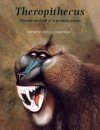![Theropithecus: The Rise and Fall of a Primate Genus Theropithecus: The Rise and Fall of a Primate Genus]()
Click to have a closer look
About this book
Contents
Customer reviews
Related titles
About this book
This unique volume provides a comprehensive and up-to-date examination of all aspects of the biology of the Old World monkey genus, Theropithecus, which evolved alongside our human ancestors. The authors explore the fossil history and evolution of the genus, its biogeography, comparative evolutionary biology and anatomy, and the behaviour and socioecology of the living and extinct representatives of the genus. The parallels between the evolution of Theropithecus and early hominids are discussed. There are also two chapters of particular significance which describe how an innovative and exciting approach to the modelling of the causes of species extinction can be used with great success. This highly multidisciplinary approach provides a rare and insightful account of the evolutionary biology of this fascinating and once highly successful group of primates. Theropithecus will be of interest to researchers in the fields of primatology, anthropology, palaeontology, and mammalian behaviour, physiology and anatomy.
Contents
Preface; Acknowledgements; 1. Introduction; Part I. Fossil Evidence and Phylogeny: 2. Theropithecus darti from the Hadar Formation, Ethiopia; 3. Evolution of Theropithecus in the Turkana Basin; 4. Are P. baringensis R. Leakey, 1969, and P. quadratirostris Iwamoto, 1982, species of Papio or Theropithecus?; 5. Theropithecus fossils from Africa and India and the taxonomy of the genus; 6. Theropithecus from Ternifine, Algeria; 7. The phylogeny of Theropithecus; Part II. Biogeography and Evolutionary Biology: 8. Climate change, biogeography and Theropithecus; 9. African terrestrial primates: the comparative evolutionary biology of Theropithecus and the Hominidae; Part III. Anatomy of the Fossil and Living Species of Theropithecus: 10. Allometric aspects of skull morphology in Theropithecus; 11. Evolution of the masticatory apparatus in Theropithecus; 12. Dental microwear and diet in extant and extinct Theropithecus: preliminary analyses; 13. The development and microstructure of the dentition of Theropithecus; 14. Postcranial anatomy of extinct and extant species of Theropithecus; Part IV. Behaviour and Ecology of Living and Fossil Species of Theropithecus: 15. Social organisation of the Gelada; 16. The ecology of Theropithecus gelada; 17. Food digestion and energetic conditions in Theropithecus gelada; 18. Socioecology of the extinct Theropiths: a modelling approach; 19. Ecological energetics and extinction of giant gelada baboons; Appendices; Index.
Customer Reviews
Edited By: NG Jablonski
552 pages, 60 line diagrams, 45 b/w photos, 95 tables
...an impressive array of approaches to understanding this other group of late Neogene large African terrestrial primates. Gregory J. Retallack, Priscum "...As a primate, theropiths are important for our evolution. This volume is a fine study of the genus, and it is highly recommended." New York Paleontological Society "Nina Jablonski's book should introduce a wider audience to the geladas, and seve as an indispensible reference for those who work on the genus and anyone with an interest in the Plio-Pleistocene...I feel that this is a very valuable book and that the editor, authors and publisher have accomplished a great serice in producing this volume." Journal of Human Evolution "It is a tour de force. The layout, typesetting, the quality of the photographs, and even the jacket illustration are first rate. The contributors hail from eight different countries and are all experts in their respective fields. But its content and organization are where this volume truly excels. The editor, Nina Jablonski, has done a superb job, uniting the topics of the volume into four main sections...The topical coverage of Theropithecus in this fine volume is nearly perfect...[T]he volume will remain an important source of information about this unusual primate well into the twenty-first century. This is a volume that every primatologist, primate paleontologist and all sentient paleoanthropologists should have on their shelves...Nina Jablonski deserves thanks from all of us for assembling this wonderful work." Russell L. Ciochon, Evolutionary Anthropology


































